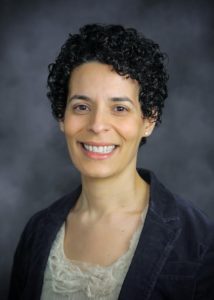Sandra Whitlock, MD

Sandra Whitlock, MD is an Assistant Professor of Medicine at the UNC School of Medicine in Asheville. She has a BA (2000) from Cornell University, and an MD (2004) from Columbia University. She did her residency in Internal Medicine at the University of Chicago Medical Center (2007), and completed a fellowship in Palliative Medicine at Harvard (2008).
In addition to Dr. Whitlock’s role as Assistant Professor, she also serves as the Associate Program Director for UNC SOM in Asheville, and a Palliative Care Physician at Mission Medical Associates. Additionally, she teaches medical students at UNC Asheville, and teaches in the MAHEC Family Medicine Resident as Teachers series in addition to other resident education programming. Currently, she serves as the AHEC Liaison to UNC Asheville for the Academy of Educators.
Outside of the office, Dr. Whitlock likes to spend her time outdoors with her family.
What made you want to become a doctor?
Growing up with two biology professors for parents, I was immersed in a wonder and appreciation of science and learning, but always envisioned myself in a role of connecting with and caring for others. Medicine was a natural fit.
What are your clinical or research interests?
My clinical interests are in adult palliative care medicine and helping develop the primary palliative care skills of other clinicians and colleagues.
How did you choose your specialty?
I was very interested in critical care as an internal medicine resident (so much so that I requested a second MICU month during my intern year!). I loved the acuity and intensity of the ICU, exploring the pathophysiology of critical illness, and learning about the technology of life support measures. I fully expected that I would pursue fellowship training in critical care until I realized that the most meaningful and fulfilling part of being in the ICU for me was connecting with patients and families in a time of incredible vulnerability and need. I discovered that the ability to sit in silence with a patient’s suffering could be just as powerful of a healing tool as the most high-tech advances in medicine. These realizations led me to the field of palliative medicine. I still feel incredible gratitude that my journey through medicine led me here.
Do you have any hobbies?
I enjoy running with a group for laughs and social interaction, but also love running by myself when I need peace and solitude. In addition, I inherited a passion for gardening from my father and hope to pass that love onto my daughters. Thanks to my husband, I am also a pleasantly reluctant mountain biker, paddler, and camper.
What are your education scholarship interests?
I am very interested in teaching communication skills to learners of all levels and developing ways to integrate communication skills training into undergraduate medical education. When I was a trainee, I found that I struggled with difficult conversations with patients and families. Through attentive work and practice, I found that I could build, hone, and teach these communication skills just like any other.
What is your favorite part of teaching?
I love being able to help learners through a challenging patient encounter by debriefing the interaction step by step and thinking through the language, emotions, and non-verbal cues that can be used to facilitate a therapeutic relationship even in the most difficult of scenarios. I have also really enjoyed serving as an advisor to our Asheville campus medical students, who are an unbelievably thoughtful and compassionate group of individuals. They are amazingly attuned to both the medical and psychosocial needs of their patients and community. I have felt extremely thankful in my role of supporting them through the ups and downs of medical school.
What have you found to be most valuable about the Academy of Educators?
I love the connection with other physicians who are passionate about teaching and medical education. I find that the AOE is extremely welcoming and supportive of the faculty development needs of preceptors across our state, regardless of type or site of practice. I really appreciate the willingness and desire to engage all preceptors in our common goal to train the next generation of physicians.
What would you want people to know about you before they walk in your door?
I want others to know that I like to laugh and enjoy work and life outside of work. I do my best to be a good listener for my patients, colleagues, and students. I try to be respectful and mindful of the needs of those around me and honest in my short-comings.
What else would you like to share with the AOE community?
I would love for the AOE community to know that our Asheville Campus provides a wonderful and supportive environment for our third year medical students to grow and thrive. We have an exceptionally dedicated group of preceptors who love to teach despite busy clinical practices and other pressures. Our preceptors truly have made this a special place to learn both the science and art of medicine.
